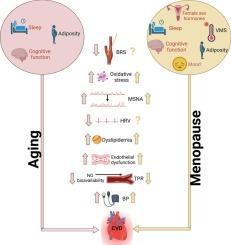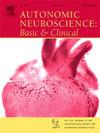Menopause and its effects on autonomic regulation of blood pressure: Insights and perspectives
IF 3.3
4区 医学
Q2 NEUROSCIENCES
引用次数: 0
Abstract
Cardiovascular disease (CVD) risk increases substantially around the typical age of menopause (∼51 yrs). While the mechanisms underlying this phenomenon remain to be precisely elucidated, menopause-related autonomic (dys)function likely plays a key role in CVD development in postmenopausal females. Sympathetic activity is known to increase with age and may rise more steeply in older females, resulting in autonomic imbalance and chronic disease. The menopausal loss of estradiol, a major female sex hormone, contributes to changes in autonomic and vascular physiology and is implicated in prominent menopause symptoms such as sleep difficulty and vasomotor symptoms (hot flushes/night sweats). Estrogen replacement can mitigate some of these negative health effects, but hormone therapy may not be able to reverse all menopause-linked autonomic dysfunction. Thus, this review explores the vast and complex web connecting menopause physiology and symptomatology, including how sex-hormone loss and menopause symptoms may impact autonomic function– in particular, through altered sympathetic regulation of blood pressure and impaired vagal tone– as a gateway to adverse cardiovascular health and greater CVD risk.

更年期及其对血压自主调节的影响:见解和观点
心血管疾病(CVD)的风险在绝经的典型年龄(~ 51岁)左右显著增加。虽然这一现象背后的机制仍有待明确,但绝经相关的自主神经功能可能在绝经后女性心血管疾病的发展中起着关键作用。交感神经活动随着年龄的增长而增加,在老年女性中可能增加得更厉害,从而导致自主神经失衡和慢性疾病。雌二醇是一种主要的女性性激素,绝经期雌二醇的丧失有助于自主神经和血管生理学的变化,并与睡眠困难和血管舒缩症状(潮热/盗汗)等突出的更年期症状有关。雌激素替代可以减轻这些对健康的负面影响,但激素疗法可能无法逆转所有与更年期相关的自主神经功能障碍。因此,本综述探讨了连接更年期生理学和症状学的庞大而复杂的网络,包括性激素丢失和更年期症状如何影响自主神经功能-特别是通过改变血压的交感调节和迷走神经张力受损-作为不良心血管健康和更大心血管疾病风险的门户。
本文章由计算机程序翻译,如有差异,请以英文原文为准。
求助全文
约1分钟内获得全文
求助全文
来源期刊
CiteScore
5.80
自引率
7.40%
发文量
83
审稿时长
66 days
期刊介绍:
This is an international journal with broad coverage of all aspects of the autonomic nervous system in man and animals. The main areas of interest include the innervation of blood vessels and viscera, autonomic ganglia, efferent and afferent autonomic pathways, and autonomic nuclei and pathways in the central nervous system.
The Editors will consider papers that deal with any aspect of the autonomic nervous system, including structure, physiology, pharmacology, biochemistry, development, evolution, ageing, behavioural aspects, integrative role and influence on emotional and physical states of the body. Interdisciplinary studies will be encouraged. Studies dealing with human pathology will be also welcome.

 求助内容:
求助内容: 应助结果提醒方式:
应助结果提醒方式:


